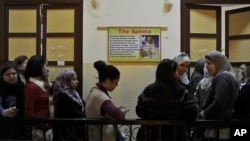Egypt is entering the next stage of its political transition with parliamentary elections, a process that started Monday and is expected to continue for three months. But, after a tumultuous year and now more than a week of violent demonstrations, many Egyptians are anxious about their country's future.
|
Victor Beattie's Q&A with David Farris, director of the International Studies Program at Roosevelt University in Chicago:
|
University student Habiba el Husseiny is not hopeful. "I honestly don't want to be a pessimist. I want a better future for us. Now I don't think it's the right time for them to take place, but they have to take place," he said.
It is a dilemma discussed in Husseiny's political science class at The American University in Cairo.
|
Major Alliances for Egypt's Parliamentary Elections Democratic Alliance for Egypt: Formed in June 2011, it was the first significant political coalition to emerge after President Hosni Mubarak's February resignation. The coalition is led by the Muslim Brotherhood's Freedom and Justice Party and includes at least five other political groups. The alliance started out as a broad-based coalition of liberal and Islamist parties but some of its original members left due to ideological differences. Islamist Alliance (Alliance for Egypt): Led by the Salafist party al-Nour and includes at least two other groups. Its members were originally part of the Democratic Alliance but split because of a disagreement over the number of candidates they would be able to field in the elections. The Islamist Alliance formed in late September. Egyptian Bloc: The liberal coalition has lost members since its formation in August and now includes only the Free Egyptians, Social Democratic and al-Tagammu parties. The bloc says it hopes to bring together political forces that are committed to a civil democratic state based on a principle of separation between religion and politics. Completing the Revolution Alliance: Formed in October, the alliance includes youth, socialist, liberal and moderate Islamist parties. Most were formerly part of the Egyptian Bloc. Members include the Revolutionary Youth Coalition, the Egypt Freedom Party and the Socialist Popular Alliance Party |
"How many of you have been to Tahrir? Two? Only two?" political sociologist Said Sadek asks students about their involvement in the protests.
Habiba Husseiny says she plans to visit Tahrir Square to oppose the government crackdown on demonstrators, not to support the protesters' anti-military cause.
"We're in very unstable times, and the economy is a disaster. So this is not what they should be focusing on now. They [protesters] should be focusing on our economy, our tourism, everything else except that," Husseiny stated.
Said Sadek says the military gives some Egyptians a sense of stability after the tumultuous events of the Arab Spring.
"The military is basically middle class, urban middle class, and they have many economic interests," he noted.
But the civil-military conflict in Tahrir Square is not the only source of tension. Sadek blames Islamist politicians for inspiring further resentment and unrest.
"Political Islam is not Islam. These are politicians who are using religion to reach power. And they are building on that class struggle -- division between the village and the city, Bedouin life and modern life. And they build on that," he said.
These different voices have left some Egyptians even more alienated.
Hassa'an says Egypt is entering a dark stage, with most parties having interests that do not reflect public opinion. The working class, he says, are the "silent majority."
At The American University in Cairo, Professor Sadek is challenging his students to understand where they fit in Egypt at this historic crossroads. "Are you the majority or the minority?" he stated.
No matter how uncertain these days might be for many Egyptians, experts say the results of the elections might make that question a little easier to answer.















